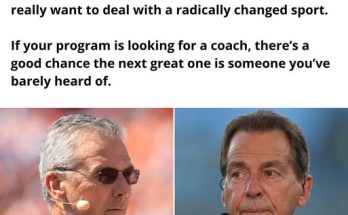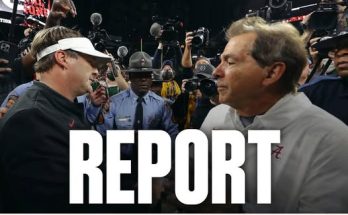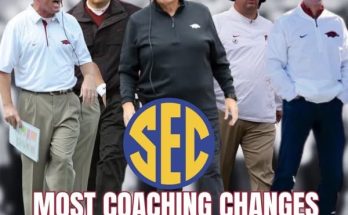Former Georgia linebacker Davin Bellamy has always been known for his honesty, charisma, and deep understanding of football culture, both as a player and as a leader within the Georgia Bulldogs program. Recently, he shed light on a fascinating truth that many may have suspected but few within the program had openly admitted: the Georgia Bulldogs’ rise to dominance under Kirby Smart wasn’t born in isolation. It was, as Bellamy described on The Water Boyz Show, modeled after one of the most successful dynasties in college football history — Nick Saban’s Alabama Crimson Tide.
Bellamy’s words painted a vivid picture of the evolution of Georgia’s football identity. He explained that when Kirby Smart arrived in Athens, he brought more than just his defensive expertise and recruiting prowess; he brought with him the DNA of a championship culture — one he had lived and breathed for nearly a decade under Saban’s tutelage. For Georgia fans and players, that influence was transformative. The result was not a carbon copy of Alabama, but a recalibrated, Georgia-infused version of that relentless standard of excellence.
Bellamy’s insight offered a behind-the-scenes perspective into how Smart and his staff meticulously reshaped every facet of the Georgia program — from the daily discipline in workouts and meetings to the psychological edge players were expected to cultivate. “When Coach Smart got there,” Bellamy said, “everything felt different. You could tell he had a blueprint — and it was the Alabama way.”
To truly understand what Bellamy meant, one must revisit the landscape of Georgia football before Smart’s arrival. The Bulldogs were respected, consistently competitive, and full of tradition, but they weren’t feared. Under Mark Richt, Georgia often fielded top-tier talent, yet struggled to sustain elite consistency. They were close — painfully close — but never quite over the hump. Kirby Smart, arriving in 2016 after years as Nick Saban’s right-hand man at Alabama, recognized that Georgia didn’t just need better players. It needed a completely different mindset.
Bellamy recalled that shift vividly. “It wasn’t just about winning anymore,” he explained. “It was about doing things the right way every single day. There was no shortcut, no easy way out. Coach Smart would always say, ‘You don’t rise to the occasion — you fall to your level of training.’ That’s straight from Saban’s philosophy, but Kirby made it Georgia’s own.”
Those early years were grueling for players. Bellamy described practices that felt like battles, accountability sessions that left no room for excuses, and an atmosphere that demanded total buy-in. But beneath that intensity was a sense of purpose. Georgia was being molded into a machine — one that mirrored Alabama’s precision, discipline, and mental toughness.
By the time Georgia reached the 2017 season, that transformation was visible to the entire college football world. The Bulldogs weren’t just talented — they were ruthless, prepared, and unshakeable. Bellamy himself was a central figure in that identity. His strip-sack of Notre Dame quarterback Brandon Wimbush during the Bulldogs’ early-season win became symbolic of Georgia’s new edge. That play wasn’t just athleticism; it was the product of an attitude, a relentlessness that Smart had drilled into every corner of the roster.
Bellamy also revealed that Smart’s approach wasn’t simply about copying Alabama, but about adapting the Tide’s structure to fit Georgia’s unique environment. “Coach Smart knew what worked at Alabama,” he said. “But he also knew Georgia was different — different fans, different energy, different expectations. So, he kept the core values the same — discipline, toughness, competition — but added his own twist. He made it personal for us.”
That “personal” element became a defining trait of the Georgia program. Smart emphasized the “connection” principle — the belief that players had to genuinely care about one another to reach their potential as a team. While Alabama under Saban often projected a business-like, militaristic efficiency, Georgia’s rise under Smart carried more emotional intensity. Bellamy said that balance — the combination of Alabama’s structure with Georgia’s heart — became the secret formula for success.
He remembered moments when Smart would walk into team meetings and challenge the players not just physically, but mentally. “He’d say, ‘You think you’re working hard? Alabama’s working harder.’ He used that as motivation all the time. We didn’t want to just be like Alabama. We wanted to beat Alabama at their own game.”
That mindset became prophetic. In 2021 and 2022, Georgia did exactly that — capturing back-to-back national championships and dethroning Alabama as the standard of the sport. But Bellamy insists that foundation was laid years earlier, during the grind of his generation of Bulldogs who bought into Smart’s system when it was still just an idea. “We were the guinea pigs,” he laughed. “Kirby came in and broke us down to build us back up. Everything — the way we practiced, the way we watched film, the way we talked about football — it all changed. And that’s why Georgia is Georgia now.”
Bellamy’s respect for Smart runs deep, but his reflection also highlights the genius of Nick Saban’s long-lasting influence across college football. In many ways, Saban’s “process” has become a coaching tree of ideas replicated across the sport — from Jimbo Fisher and Lane Kiffin to Steve Sarkisian and now Kirby Smart. What separates Smart, Bellamy suggested, is his ability to evolve the model rather than just imitate it. “Kirby learned from the best,” he said, “but he’s not Saban 2.0. He’s Kirby Smart — the best version of himself. And that’s why Georgia’s dominance feels different.”
That difference is evident in recruiting, where Smart has built an empire that rivals even Alabama’s. Bellamy credited that to the culture Smart created. “Guys come to Georgia now because they know they’re going to be pushed to the limit — but also because they see that connection,” he said. “It’s not fake. It’s not just slogans. Everything we did had a purpose, and Kirby made sure we knew that.”


